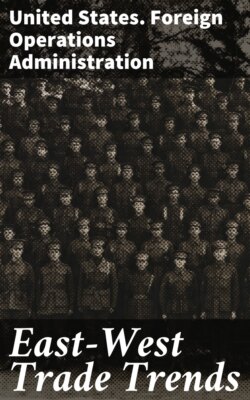Читать книгу East-West Trade Trends - United States. Foreign Operations Administration - Страница 7
На сайте Литреса книга снята с продажи.
How the Kremlin Controls Trade
ОглавлениеTable of Contents
All foreign trade of the countries of the enlarged Soviet empire was placed under absolute state control. For both the U.S.S.R. and the satellites, international trade is now not only a 100-percent monopoly of the state, but also an in*tegral part of the planned economy, officially proclaimed as such. Each country, as a part of its general economic plan, estimates its import requirements and then develops a program of exports to pay for the imports. These country plans are coordinated by Moscow. Part of the machinery of all this economic planning and trade coordination is an organization, with headquarters in Moscow, called the Council of Mutual Economic Assistance.
This totalitarian trading system insures that foreign trade serves the purposes of the state.
Top priority in trade planning is given to the requirements of the U.S.S.R. Bloc countries are required to give one another preferential treatment in trade. With this system the export of any items to the West is easily restricted as it suits government purposes—whether or not the items could be considered as “strategic.”
A vast amount of commercial information is obtained by bloc governments through their dealings with free-world traders and through their intelligence services. This provides Moscow with a comprehensive picture of the bargaining strengths and weaknesses of free-world traders.
Moreover the Soviet-bloc governments, as large buyers and sellers controlling the production and trade of a whole country, indeed a group of countries, enjoy certain bargaining advantages in dealing with the many smaller competing buyers and sellers in the marketplaces of the free world. Since losses on individual transactions can be absorbed in longer-term government gains on other deals, the unit profit need not be the factor that determines the advantage of a deal, as it generally does for the free-world trader. Soviet-bloc governments can—and not infrequently do—set their prices at levels which discriminate among the various buyers and sellers with whom they deal. They exercise monopoly control not only in selling their own goods abroad but also in disposing of imported goods at home. The Soviet-bloc governments get bargaining advantages from such practices, made possible by their totalitarian trading system—practices which the West would not wish to imitate but which it might as well squarely face.
Foreign trade is a political as well as an economic weapon in the hands of the Soviet Communist state. By way of illustration, in 1948 it was possible for the Kremlin first to reduce and then to cut off all trade between Eastern Europe and Yugoslavia as a part of the attempt to bring Marshal Tito to his knees. The attempt failed, but the Yugoslavs suffered serious economic difficulties before they could readjust. Even earlier, the world had seen how the Kremlin refused to allow the Eastern European countries to benefit from the flow of Western goods that could have been theirs under the Marshall plan—another evidence of how the state’s objectives took precedence over the people’s needs.
The Kremlin in its propaganda made much of Western trade restrictions. But the West’s limited controls over the shipment of strategic goods did not come into existence until long after the Kremlin had begun using trade as a cold-war weapon. Even then these Western controls, far from being aggressive actions against peaceful trade or against the welfare of populations, were common-sense measures of economic defense, designed only to foster Western security by withholding from aggression-minded governments the important war-building materials that would make aggression easier.
On the other hand, the Kremlin’s long-term objectives in its economic relations with the free world are far more than defensive. They have a dual character: strengthening the bloc and weakening the free-world powers. These objectives can be summarized as follows:
1 To feed the economy, especially the industrial-military base, with imports that help the bloc become more powerful and less dependent on the free world.
2 To drive wedges among free-world nations at every opportunity.
3 To increase the reliance of free-world nations on the bloc for markets or supplies, and thus make the free world more vulnerable to bloc pressures.
